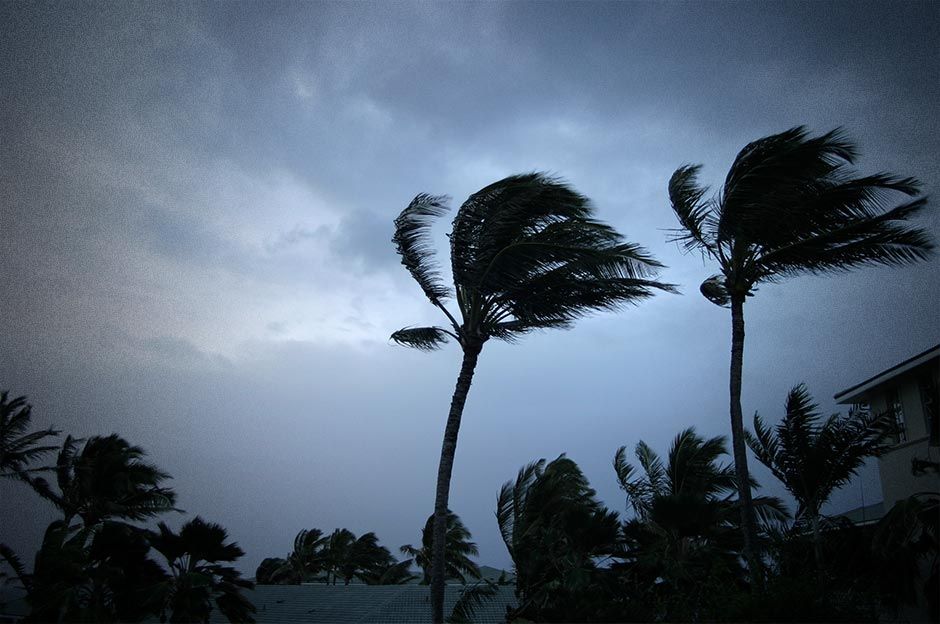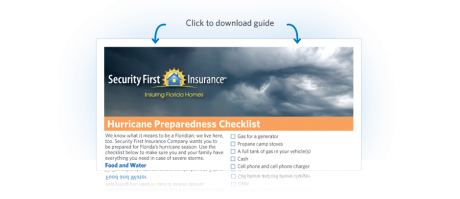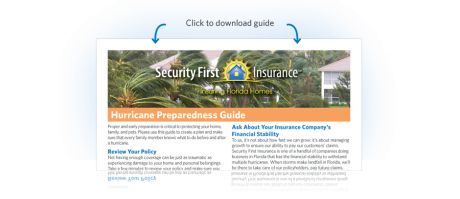Hurricane Safety Guide
Hurricanes can leave thousands of residents without power or water for days, sometimes weeks.
In the event of an evacuation, it can take up to 72 hours before emergency crews are able to enter affected communities. Our hurricane preparedness guide will help you remain prepared for the storm with recommendations for reviewing your policy and taking care of your pets.

Before the Storm
There are many steps you can take in the days before a storm that could lessen the damage to your property.
Outside Your Home
- If you don’t already have shutters for your windows and doors, purchase them. This could save you a lot of money and aggravation. If you don’t have the funds to purchase shutters, make sure you properly board your windows with plywood.
- Does your roof need to be repaired? A single loose or damaged shingle can cause severe wind damage to your home. You may want to contact a licensed and insured roofer to come and provide you with an inspection.
- Bring all loose items inside. If you have anything that is not permanently affixed to your foundation/home, take it inside.
- Keep trees and shrubbery trimmed.
- Make sure your gutters are clean to prevent flooding.
Inside Your Home
- Monitor the NOAA weather radio for important info.
- Turn your refrigerator and freezer to the coldest setting so that food will last longer if you lose power.
- Make sure you have a flashlight close by--and backup batteries.
- Deadbolt your doors. The throw on a deadbolt is much longer than a standard door knob and requires more pressure to open.
- Keep a fire extinguisher readily available.
- Check smoke and carbon monoxide detectors to verify they are functioning properly.
- Know your evacuation plan. Contact your local emergency management office for information about the safest evacuation routes and locations of shelters.


Outside Your Home


Inside Your home
Check Your Policy
Not having enough coverage can be just as traumatic as experiencing damage to your home and personal belongings. Take a few minutes to review your policy and make sure you have enough coverage. Speak with your agent about Hurricane Deductibles and any other questions you might have.
Choose the right hurricane deductible.
Always make sure you have the funds set aside to cover the deductible you have chosen on your policy. If your home is damaged and you are unable to pay the deductible, it will prolong the recovery process. Companies offer different deductible options. It’s important that you carefully consider the right option for you.
Review your personal property coverage.
Throughout the years, as you’ve purchased or sold items, have you updated the personal property coverage (Coverage C) on your policy? It’s important that the amount selected for this coverage is enough to repair or replace damaged items. An important coverage is Personal Property Replacement Cost. If your items are damaged, they will be valued brand new when replacement cost value is applied. Without this coverage, personal property is covered at its depreciated (“actual cash”) value. Security First Insurance includes replacement cost coverage on base policies. If you are not insured by Security First Insurance, check to see if you have replacement coverage.
Review Replacement Cost.
Make sure your home has the right coverage to replace/repair your home. This is shown as Coverage A on your homeowner’s policy. Will the amount on your policy cover the cost to completely rebuild your home? Please keep in mind that this is not the same amount as the value of your home in the real estate market. It is the actual cost, including labor and materials, to rebuild.
Consider Flood Insurance
Your base policy does not include flood insurance. Even if you don’t live in a Special Flood Hazard Area, we encourage you to purchase Flood insurance. Tropical Storm Fay left many homes devastated by floods throughout the state of Florida.


Deductible


Personal Property


Rebuild Cost


Flood Insurance
After a Storm
- Continue to listen to the NOAA weather radio for important information.
- Stay inside and do not drive. There may be damaged roadways, extended rainfall, and tornados.
- Look outside for downed or dangling power lines to report to your power company.
- Inspect your home for damage. If your home is damaged, report a claim with your insurance company immediately. Take photos of the damage and keep all receipts if you make temporary repairs.
- Watch for loose animals in your community.
- Avoid tap water until you are sure it is safe.
- Use the phone for emergency calls only.
- Open cabinets carefully. Items can fall off shelves.
- Throw away spoiled food. If you are unsure, throw it away.
Taking Care of Cats & Dogs
Have pets at home? Many shelters do not accept pets, so plan ahead. Read our online guide to taking care of pets during disaster. It can also be downloaded and printed as part of our hurricane guides below.











